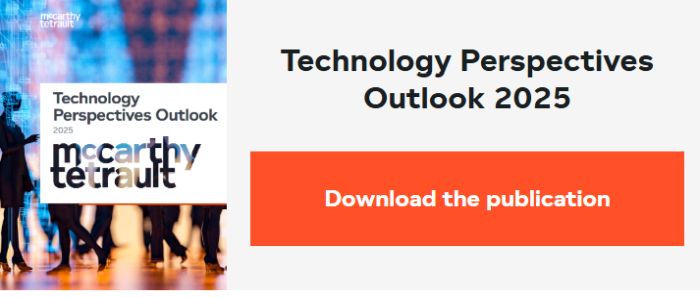- with readers working within the Healthcare industries
French version coming soon
AI is dominating the technology landscape, FinTech regulation is gathering steam, and "open banking" is a step closer to reality in Canada. McCarthy Tétrault's multidisciplinary National Technology Group, the largest and deepest at any Canadian law firm, understands how these and other developments present both risks and opportunities for your business.
Our Technology Perspectives Outlook 2025 dives deep into the past year's pivotal events and offers expert insights to help you stay ahead of the curve in the ever-evolving tech landscape. Our market-leading analysis provides a comprehensive overview of the developments from the past 12 months, and our insights will help empower you to set your strategy for the coming year.
Topics in Technology Perspectives Outlook 2025 include:
- AI Representations and Warranties in M&A Transactions
- Canadian Digital Services Tax
- Is Copyright Law Catching Up to Generative AI?
- Regulation of FinTechs – Payment Service Providers
- Introducing Open Banking to the Canadian Market
- Canadian Take Privates in 2024 and Looking Forward
- 2025 Venture Market Update
- Canadian Crypto Outlook: Progress or Standstill?
We house one of Canada's most "plugged in" teams of trusted legal and business advisors. You can rely on our insight to help you navigate the changing tech landscape and stay current with trends and regulatory compliance. Our team members are recognized thought leaders on emerging technologies, have published some of the country's most authoritative texts, and undertaken the widest range of leading-edge technology transactions across industry sectors in any Canadian law firm.
Read a snapshot from the publication below:
AI Representations and Warranties in M&A Transactions
With the emergence of generative artificial intelligence ("AI"), mergers and acquisitions ("M&A") practitioners are more and more likely to encounter AI issues during transactions. While those may involve well-known legal risks (corporate, employment, contractual, etc.), they can also entail novel ones depending notably on whether the transaction involves a company that develops or uses AI systems in its activities (or both), or the type of AI systems in question – be they generative or decision-making AI systems. Those novel issues stem notably from the way those AI systems are developed (i.e., using massive datasets) and the risks associated with their output, which can be unpredictable, biased and otherwise harmful.
In an M&A context, mitigating the risks associated with AI requires a comprehensive strategy that should start with a thorough due diligence of the target's AI profile. For detailed insights on this critical step, we refer the reader to a previous article published in our Technology Perspective Outlook 2024. Following such review, drafting robust representations and warranties ("R&W") is also essential to allocate AI risks between buyers and sellers, as we will discuss in this article.
Shares or assets purchase agreements usually include "technology" R&W, which are often sub-divided into "information technology," "privacy" and "intellectual property" R&W. Many AI risks can be addressed through such standard clauses. For instance, a target's ownership of intellectual property ("IP") rights in its AI solutions will generally be captured by a standard IP ownership R&W. After all, AI systems are software code that are subject to IP protections, including copyrights. However, in many cases additional bespoke AI R&W will be required to cover all relevant AI risks.
Download the publication to read more.
To view the original article clickhere
The content of this article is intended to provide a general guide to the subject matter. Specialist advice should be sought about your specific circumstances.



